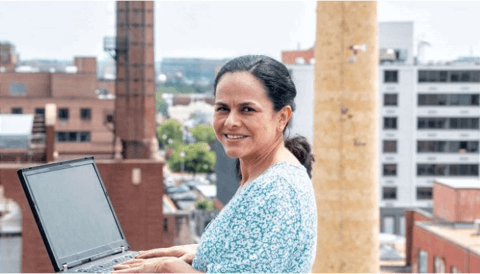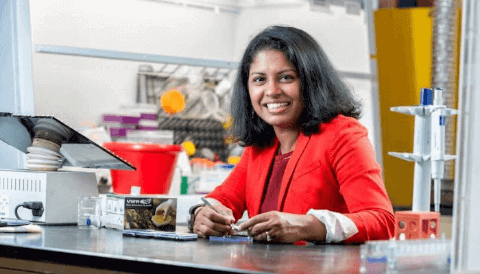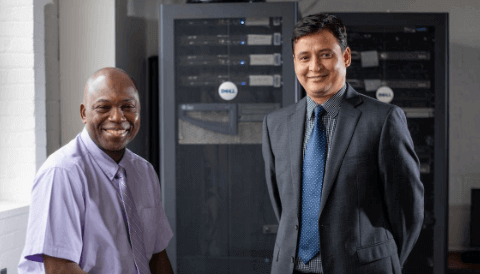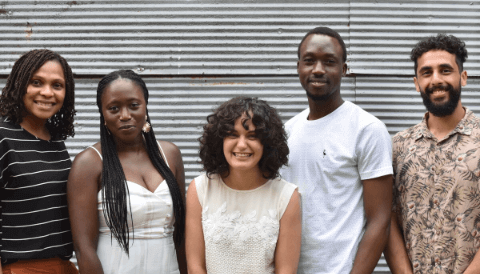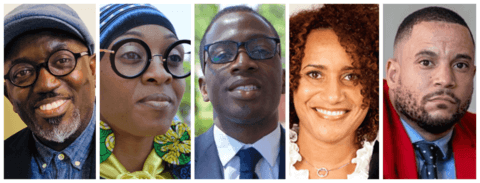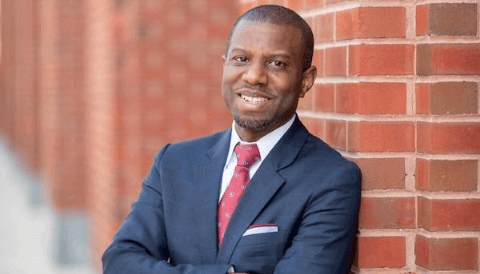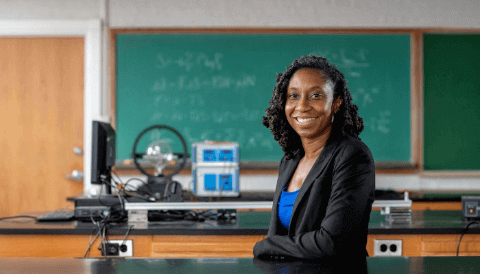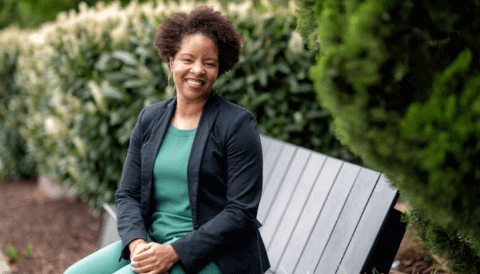Our Research Impact
Research with a bold mission: Finding new ways to improve society
Discovery happens here at Howard. Our faculty and graduate students believe in testing the limits of discovery across disciplines to solve some of the world's most complex challenges. Our motto, Veritas et Utilitas (Truth and Service), is woven throughout our research as our faculty and scholars leverage their expertise to serve the communities that need it most. Our faculty are driven by a deep-rooted sense of purpose and inquiry, passionate about teaching and research, and committed to helping their students succeed.
Howard University remains committed to being a global thought leader and has a distinctive legacy of research. From developing novel pathways for disease prevention and conducting cybersecurity research addressing critical infrastructure systems to building models for climate resilience and analyzing models of voting behavior, our faculty and graduate students are solving problems at local, state, national, and global levels. Our faculty and students are supported by extensive grant and funding opportunities, research networks spanning the globe, modern facilities, centers, and labs, and superior research resources you would expect from a major research university such as Howard.
Areas of Impact
At Howard's Graduate School, our research scholars are connectors committed to advancing their fields and understanding the impacts of their research on communities. Our faculty and students are focused on research that informs public policy, fosters resilient and healthier communities, encourages environmental sustainability and stewardship, strengthens democratic institutions, and powers innovation and economic growth. The following cross-section of projects represents just some of the exciting daily research across our graduate programs.
AI-Driven Infrastructure Innovation
Howard is educating the next generation of experts in artificial intelligence (A.I.) research, including using AI-driven innovation to design smarter, more efficient, and safer infrastructure. An interdisciplinary team of faculty researchers led by Howard Professor of Civil and Environmental Engineering, Claudia Marin, Ph.D., P.E., is uncovering new ways to detect structural problems and assess structural integrity in our nation's infrastructure, using artificial intelligence-based modeling to transform tomorrow's cities for the better. The researchers are committed to providing reliable, sustainable solutions to our nation's aging infrastructure. See full story.
In Search of a Solution in Sugar Shields
When viruses take over our bodies, they provide a sugar shield to build a defense against the immune system. Howard Associate Professor of Chemical Engineering Preethi Chandran, Ph.D., led an NSF-funded study, with co-investigators Howard Professor of Medicine Sergei Nekhai, Ph.D. and Georgetown University Associate Professor of Medicine Seble Kassaye, M.D., to understand the biophysics of viruses' sugar shields and their adherence to their hosts' sugars, providing an edge in the fight against viruses. This research is one of the many examples of how Howard researchers are working to improve the health and well-being of communities. See full story.
Garuba and Dr. Danda Rawat
Testing the Limits of Intelligence
What we think we know about cars and autonomous controls may not be enough. How should a self-driving car act when someone vandalizes a roadway speed limit sign? This is one of the questions the research team at Howard University's Center of Excellence in Artificial Intelligence and Machine Learning (CoE-AIML), a DOD-funded initiative led by Howard Professor of Computer Science Danda B. Rawat, Ph.D., is investigating. The Center also aims to examine racial and gender bias in artificial intelligence, which may lead to unfair decisions or biased outcomes for groups or individuals. See full story.
Breakthroughs made possible through collaboration
Some of the most significant breakthroughs in innovation, medicine, and science are made possible through collaboration. Meaningful solutions often emerge when research scholars listen to the communities most impacted by a problem, consider various perspectives, and collaborate to create meaningful change across fields and sectors. Cross-disciplinary research and teaching is our core strength at Howard's Graduate School. We're committed to building a space where researchers, practitioners, and policymakers can share their knowledge and collaborate to advance transformative change.
Delgado Vela and her research lab group at Howard
Wastewater Deep to Detect COVID-19 Levels
When early detection systems work, they can prevent devastating outbreaks. Howard Assistant Professor of Civil and Environmental Engineering Jeseth Delgado Vela, Ph.D., is part of a team of researchers from Howard University, North Carolina State University, Rice University, and USC, collaborating on nationwide efforts to monitor SARS-CoV-2 particles, the virus responsible for causing COVID-19, in wastewater. Wastewater surveillance as a public health monitoring tool fills a critical gap in helping stem the spread of COVID-19 when limited testing capacity and asymptomatic infections result in uncertainty about disease prevalence. See full story.
Muhammad, Dr. Brandon Hogan, Dr. Keesha Middlemass, and Dr. Ravi
Perry.
Digital Disinformation, Race, and Democracy
Digital manipulation and voter suppression efforts disproportionately target communities of color and other marginalized groups. Funded by a $250,000 grant from the Knight Foundation, a cross-disciplinary team of Howard researchers: Assistant Professor of Communications Roger Caruth, Ph.D., Associate Professor of Criminology Bahiyyah Muhammad, Ph.D., Associate Professor of Philosophy Brandon Hogan, Ph.D., Associate Professor of Political Science Keesha Middlemass, Ph.D., and Professor of Political Science Ravi Perry, Ph.D., investigate the impacts of digital manipulation and disinformation on Black communities. See full story.
Leading scholars: Translating policy into practice
As a graduate student at Howard, you'll work alongside scholars on the research you're passionate about, which could lead to publications or patents or have a global impact. Our faculty's research is winning prestigious grants from organizations like the National Institutes of Health, the National Science Foundation, and the National Academies. Our faculty are not only leading collaborative research efforts that make a difference in their fields and have a broad impact, particularly in communities of color and marginalized groups, but they're also committed to mentoring their students.
Howard Professor of Counseling Psychology Ivory A. Toldson, Ph.D., is one of the nation's top education scholars (Education Week's 2022 Edu-Scholar Public Influence Rankings). From ensuring funding for STEM education and research is equitable to helping school districts understand how data can reliably be used to comprehend issues of racial injustice and equity in their schools, Dr. Toldson's research has helped shape education policy and practice across the U.S. Dubbed one of "30 leaders in the fight for Black men," by Newsweek Magazine, Dr. Toldson's commitment to ensuring research is accessible to practitioners and policymakers makes him a sought-after expert. Dr. Toldson's work has been featured on MSNBC, C-SPAN2, NPR, CNN, The Washington Post, The New York Times, The National Journal, and Essence Magazine. See full story.
Changemakers: Accelerating change through science
Howard graduate students conduct rewarding research in the lab and out in the field. Students pursue their research in a close-knit, highly collegial academic environment. Faculty mentors are inspired by their students' ideas and perspectives. Grant-funded research initiatives allow students to follow their intellectual curiosity under the direction of faculty who are leaders in their fields. Find inspiration for your own research journey from our students’ research stories.
Unearthing the Legacy of Enslaved Africans
Genetic anthropologist Carter Clinton (Ph.D., '19) is expanding the presence of African-descended peoples in genetics research. He analyzes the microbial, elemental, and geospatial relationships in soil samples from the New York African Burial Ground in Lower Manhattan. This prominent archaeological site houses the human remains of more than 15,000 free and enslaved Africans buried there 400 years ago. The soil samples are kept at Howard's W. Montague Cobb Research Laboratory. Dr. Clinton uses advances in genomics to reconstruct, from the DNA found in the soil samples, the lifestyles, diets, and health conditions of this historic African population. See full story.
Fighting Breast Cancer with Physics
Howard graduate students are leading treatment advances for rare and aggressive cancers like triple-negative breast cancer. Black women are more likely to be diagnosed with triple-negative breast cancer. Yet this group is historically understudied in cancer research. Dr. Kenisha Ford is hoping her research will change that. Dr. Ford is uncovering a potential pathway for a new targeted breast cancer treatment, considering environmental factors that increase the risk for certain strains of breast cancer. Her research, in the ever-evolving field of genodynamics, might hold answers to the prevention, not only treatment, of Triple-Negative Breast Cancer. See full story.
Restoring the Right to Vote
Howard's researchers are working at the forefront of critical social, political, and economic issues important to communities across the United States. Sociology doctoral student and Winslow Sargeant Doctoral Fellow Shannell Thomas explores the role of race and the framing of 'civic virtue' in the continued disenfranchisement of Florida's ex-felons. She explains how the ambiguity of "sentence completion" has traditionally been used to justify why so many ex-felons are denied the right to vote. Thomas' research moves the needle on the critical work to create a more inclusive democracy and restore justice to a broken system. See full story.

